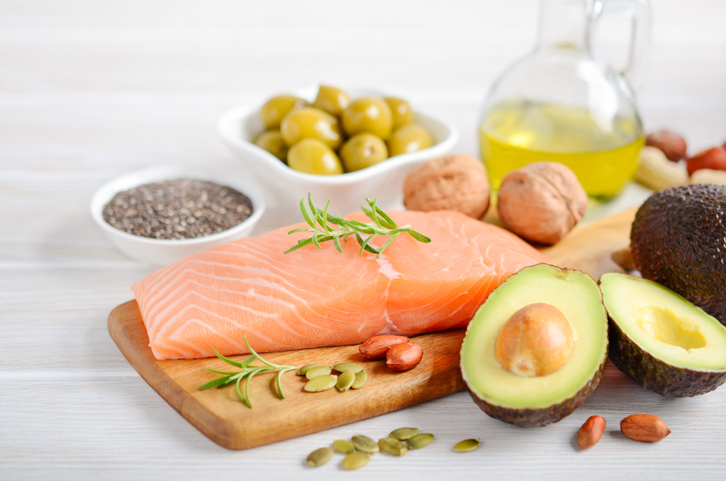Heart Health: Manage Your Fats

This is the third post of the four-part series on heart health. In the last post you learned how managing the sugars in your diet can help reduce inflammation and protect your heart. Today you will learn about dietary fats that promote inflammation in the body and tips for replacing them with more heart-healthy options.
Don’t Fear Dietary Fat!
There is an unfortunate rumor that continues to persist in the United States—that dietary fat is bad for you. No so! Dietary fat is essential for:
- Blood sugar control
- Metabolism and fat-burning potential
- Appetite regulation
- Proper brain function and mood
- Hormone function
- Nutrient-absorption
In the past we were advised to limit our fat intake to protect our health, which lead to the term ‘low-fat’ being confused as “healthy”. I’m referring to packaged products here (think cookies and sugar-laden yogurt), as natural foods like fruits and vegetables are both low-fat and overflowing with nutrition. Unfortunately, when fat is removed from a product, sugar and salt are added in for flavor.
Dietary Fats to Limit
Some fats however are harmful when overconsumed and some—like partially hydrogenated oils—shouldn’t be eaten at all.
Omega-6 fats are a type of fat that’s considered to be “essential”. Your body can’t make it and therefore must get it from food. The problem is, when you eat too many omega-6 fats, they can have a pro-inflammatory effect in your body.
Nuts and seeds are perfectly healthy and natural sources of omega-6 fats, so ahead and enjoy a handful as a snack or use them in your favorite recipes. Omega-6 fats become troublesome when they are processed into highly refined vegetable oils like canola, corn, cottonseed, safflower, soybean, and sunflower. These oils are found in processed foods such as breads, cereals/cereal bars, chips, pretzels, crackers, frozen meals, hummus, salad dressings, sweets, and more.
Dietary Fats to Enjoy
Omega-3 fats are another type of essential fat. They differ from omega-6’s in that they have an anti-inflammatory effect on the body. These fats can support:
- A healthy cardiovascular system
- Reduced risk of arterial disease
- Lower risk of diabetes and cancer
- Brain and mental health
Omega-3 fats are found in plant-based foods like: walnuts, almonds, hemp seeds, flax seeds, chia seeds, and pumpkin seeds.
They are also found in: grass-fed beef, butter, milk, yogurt and cheese, and in cold water fish like salmon, trout, cod, halibut, and tuna.
For a list of foods rich in omega-3 fats, check out the Top 100 Fx Products.
Healthy Fats for Cooking and Baking
Other fats to enjoy in your meals and recipes include:
- Coconut oil- for baking, sautéing, and roasting
- Extra virgin olive oil- for dressings and low temperature cooking
- Avocado oil- for dressings and high temperature cooking
- Avocados
- Olives
Five Tips for Managing Fat
To manage your fats, try one of these simple additions or swaps at your next meal:
- Stir a tablespoon of chia seeds or milled flax seed into your yogurt or oatmeal.
- Mix a handful of chopped walnuts into vegetable or rice dishes.
- Choose salad dressing made with avocado oil or extra virgin olive oil. Bragg salad dressings are a good choice.
- Order the salmon, trout, cod, halibut, or tuna at your favorite restaurant.
- If you eat meat, favor free range and grass-fed. Gradually work to minimize portions and frequency.
Food for Thought…
It’s so much easier to stay on track when you take a little time to prep your meals. Set yourself up for success by having your breakfast ready to go the evening before. Smoothies, overnight oats and homemade breakfast bars are all super easy to make ahead of time. Here’s a recipe for one of my favorite breakfasts: Maca Energy Bars. It’s rich in anti-inflammatory fats to keep you nourished and satisfied for hours. Maca is a Peruvian plant grown in the Andes Mountains and is known for its mood-enhancing effects. You can find it in the Wellness Department at your local Heinen’s.
In the final post of this series, Heinen’s Chief Medical Officer Dr. Todd Pesek discusses a powerful supplement with antioxidant properties that may help improve heart health and blood sugar levels.
